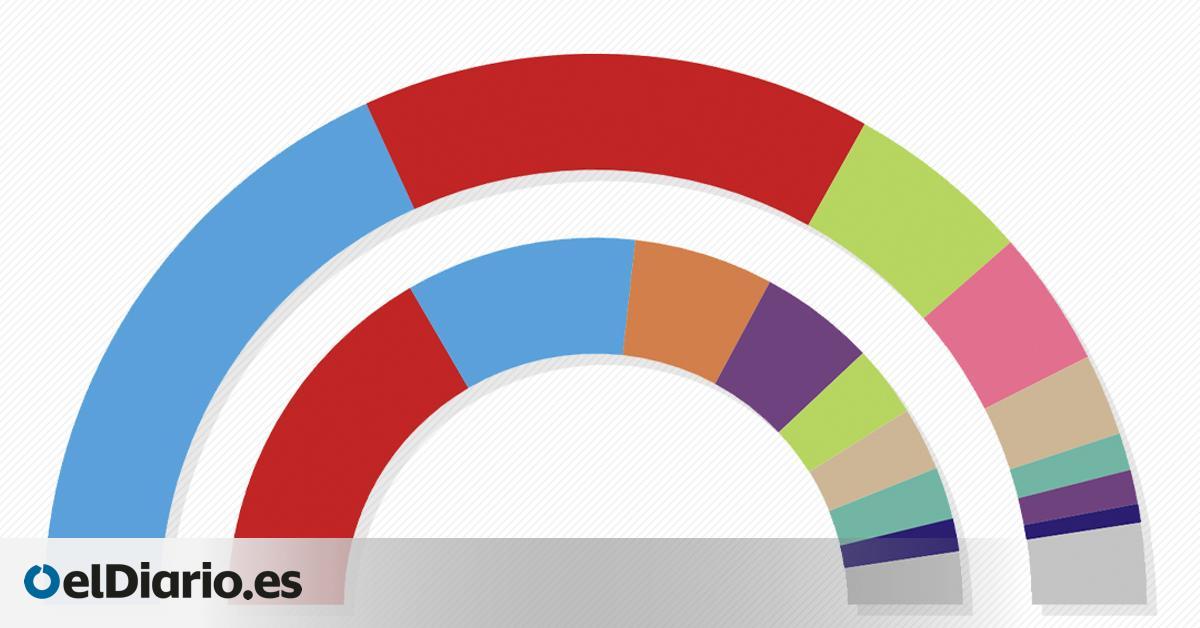
European Elections 2024
Simple Lógica survey for elDiario.es. Data in % of vote
The Popular Party has an advantage a few days before the campaign for the elections to the European Parliament begins on June 9. Alberto Núñez Feijóo’s party enters the pre-campaign with a 6.5 point margin over the PSOE ahead of a meeting with the polls that the leadership of the popular party has proposed as a sort of second round of the general elections on July 23, in which the PP was the leading force although it did not obtain the parliamentary support necessary to be able to govern.
The Simple Lógica survey for elDiario.es gives the main opposition party as the winner with 36.4% of support. This is a very notable growth compared to the last European elections held in 2019, when the PP was in the hands of Pablo Casado and was going through one of its worst moments as soon as it lost the Moncloa after Pedro Sánchez’s motion of censure against Mariano Rajoy. and, especially, due to the leakage of votes to Vox in practically all electoral events.
Five years ago the Popular Party only obtained 20.3% of the votes, so the poll predicts a historic growth of more than 16 points for the June elections.
The PSOE, which was the force that won the 2019 European elections with 33.2% of the votes, would now move to second position and remain more than six points away from the PP. The socialists would now obtain 29.9% of the votes, 3.3 points below the result five years ago. However, the PSOE has managed to reduce the margin that the PP gained from it in April when, according to Simple Lógica, the Popular Party would have obtained 36.6% of the votes – two tenths more than in May – and the Socialists, the 29.5%. The Feijóo’s advantage therefore became more than seven points, after also growing from the 35.6% that the demographic institute gave it in March.
For Vox, the 2019 European elections were one of its first electoral tests and, five years later, the far-right party would achieve significant growth, according to the Simple Lógica survey. Santiago Abascal’s party would now reach 10.9% of the votes, 4.6 points above the support it achieved five years ago, when it received 6.3% of the votes. The extreme right has also grown since April, when the demographic institute placed it with 10.5% of support. But it fails to reach the 11% of March.
The confederal space falls
The extreme right would surpass Sumar in the first meeting with the Europeans of the formation of the second vice president and Minister of Labor, Yolanda Díaz. The candidacy headed by Estrella Galán would remain in fourth place with 8% of the votes after falling from 8.6% in March and 8.7% in April. Podemos, for its part, would reach 2% of support – after also falling from 3.3% in April – so the sum of both forces in the confederal space would remain two tenths below the 10.2% of support. votes achieved by the Podemos-IU alliance in 2019.
The coalition of pro-independence forces that make up ERC, EH Bildu, BNG and Ara Mes, and that is running in the European elections under the name of Ahora Repúblicas, would also fall compared to the last elections to the European Parliament. The survey gives it 4.8% of the votes, eight tenths below the 5.6% of the votes it achieved in 2019. Junts also drops and goes from 4.6% of support five years ago to 2, 2% who consider Simple Lógica.
Finally, the Coalition for a Europe of Solidarity (CEUS), which includes under its acronym political forces such as the PNV or the Canarian Coalition, would also see its expectations reduced by remaining with only 1.1% of the votes, 1.8 points below 2019. The Simple Lógica survey also points to the disappearance of Ciudadanos from the European Parliament, which would lose the eight seats it achieved five years ago. It would be the last straw against the party that calls itself “liberal”, since until now it boasted of maintaining at least representation in the EU, after having been defeated in the general elections and all the last regional elections with the polls.
In the elections on June 9, Spain is responsible for electing 61 seats of the 720 that will make up the new European Parliament to reflect the demographic changes registered since the 2019 elections. Spain is responsible for two of the new 15 seats, so it happens from the 54 that it distributed in 2019, to which it added another five after Brexit (remaining at 59), up to the current 61. But once the elections are over, the MEPs are not grouped by nationality, but by political affinities. Each group must be made up of deputies elected in at least a quarter of the member states and have a minimum of 25 deputies.
Parliamentarians elect one of the members of Parliament as president for a renewable period of two and a half years. She represents Parliament before the other EU institutions and externally and supervises plenary debates. The deputies also elect 14 vice presidents.
Source: www.eldiario.es

